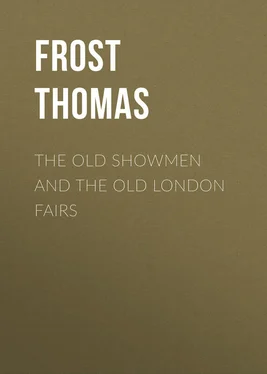Thomas Frost - The Old Showmen and the Old London Fairs
Здесь есть возможность читать онлайн «Thomas Frost - The Old Showmen and the Old London Fairs» — ознакомительный отрывок электронной книги совершенно бесплатно, а после прочтения отрывка купить полную версию. В некоторых случаях можно слушать аудио, скачать через торрент в формате fb2 и присутствует краткое содержание. Жанр: foreign_antique, foreign_prose, на английском языке. Описание произведения, (предисловие) а так же отзывы посетителей доступны на портале библиотеки ЛибКат.
- Название:The Old Showmen and the Old London Fairs
- Автор:
- Жанр:
- Год:неизвестен
- ISBN:нет данных
- Рейтинг книги:4 / 5. Голосов: 1
-
Избранное:Добавить в избранное
- Отзывы:
-
Ваша оценка:
- 80
- 1
- 2
- 3
- 4
- 5
The Old Showmen and the Old London Fairs: краткое содержание, описание и аннотация
Предлагаем к чтению аннотацию, описание, краткое содержание или предисловие (зависит от того, что написал сам автор книги «The Old Showmen and the Old London Fairs»). Если вы не нашли необходимую информацию о книге — напишите в комментариях, мы постараемся отыскать её.
The Old Showmen and the Old London Fairs — читать онлайн ознакомительный отрывок
Ниже представлен текст книги, разбитый по страницам. Система сохранения места последней прочитанной страницы, позволяет с удобством читать онлайн бесплатно книгу «The Old Showmen and the Old London Fairs», без необходимости каждый раз заново искать на чём Вы остановились. Поставьте закладку, и сможете в любой момент перейти на страницу, на которой закончили чтение.
Интервал:
Закладка:
“One cried ribs of beef, and many a pie;
Pewter pots they clattered on a heap;
There was harp, pipe, and minstrelsy.”
Of equal antiquity with the great fair at Winchester were the Chester fairs, held on the festivals of St. John and St. Werburgh, the tolls of which were granted to the abbey of St. Werburgh by Hugh Lupus, second Earl of Chester and nephew of William I. There was a curious provision in this grant, that thieves and other offenders should enjoy immunity from arrest within the city during the three days that the fair lasted. Frequent disputes arose out of this grant between the abbots of St. Werburgh and the mayor and corporation of the city. In the reign of Edward IV., the abbot claimed to have the fair of St. John held before the gates of the abbey, and that no goods should be exposed for sale elsewhere during the fair; while the mayor and corporation contended for the right of the citizens to sell their goods as usual, anywhere within the city. The citizens carried the point in their favour, and the abbot was induced to agree that the houses belonging to the abbey in the neighbourhood of the fair should not be let for the display of goods until those of the citizens were occupied for that purpose. Disputes between the abbey and the city concerning the fair of St. Werburgh continued until 1513, when, by an award of Sir Charles Booth, the abbey was deprived of its interest in that fair.
Croydon Fair dated from 1276, when the interest of Archbishop Kilwardby obtained for the town the right of holding a fair during nine days, beginning on the vigil of St. Botolph, that is, on the 16th of May. In 1314, Archbishop Reynolds obtained for the town a similar grant for a fair on the vigil and morrow of St. Matthew’s day; and in 1343, Archbishop Stratford obtained a grant of a fair on the feast of St. John the Baptist. The earliest of these fairs was the first to sink into insignificance; but the others survived to a very recent period in the sheep and cattle fair, held in latter times on the 2nd of October and the two following days, and the cherry fair, held on the 5th of July and the two following days. Whatever may have been the relative importance of these fairs in former times, the former, though held at the least genial season, was, for at least a century before it was discontinued, the most considerable fair in the neighbourhood of the metropolis; while the July fair lost the advantage of being held in the summer, through the contracted limits within which its component parts were pitched. These were the streets between High Street and Surrey Street, and included the latter, formerly called Butcher Row; and the only space large enough for anything of dimensions exceeding those of a stall for the sale of toys or gingerbread, was that at the back of the Corn Market, on which the cattle-market was formerly held.
The first fair established in the metropolis was that which, originally held within the precincts of the priory of St. Bartholomew, soon grew beyond its original limits, and at length came to be held on the spacious area of West Smithfield. The origin of the fair is not related by Maitland, Entick, Northouck, and other historians of the metropolis, who seem to have thought a fair too light a matter for their grave consideration; and more recent writers, who have made it the subject of special research, do not agree in their accounts of it. According to the report made by the city solicitor to the Markets Committee in 1840, “at the earliest periods in which history makes mention of this subject, there were two fairs, or markets, held on the spot where Bartholomew Fair is now held, or in its immediate vicinity. These two fairs were originally held for two entire days only, the fairs being proclaimed on the eve of St. Bartholomew, and continued during the day of St. Bartholomew and the next morrow; both these fairs, or markets, were instituted for the purposes of trade; one of them was granted to the prior of the Convent of St. Bartholomew, ‘and was kept for the clothiers of England, and drapers of London, who had their booths and standings within the churchyard of the priory, closed in with walls and gates, and locked every night, and watched, for the safety of their goods and wares.’ The other was granted to the City of London, and consisted of the standing of cattle, and stands and booths for goods, with pickage and stallage, and tolls and profits appertaining to fairs and markets in the field of West Smithfield.”
Nearly twenty years after this report was made, and when the fair had ceased to exist, Mr. Henry Morley, searching among the Guildhall archives for information on the subject, found that the fair originated at an earlier date than had hitherto been supposed; and that the original charter was granted by Henry I. in 1133 to Prior Rayer, by whom the monastery of St. Bartholomew was founded. Rayer whose name was Latinised into Raherus, and has been Anglicised by modern writers into Rahere, was originally the King’s jester, and a great favourite of his royal master, who, on his becoming an Augustine monk, and, founding the priory of St. Bartholomew, rewarded him with the grant of the rents and tolls arising out of the fair for the benefit of the brotherhood. The prior was so zealous for the good of the monastery that, perhaps also because he retained a hankering after the business of his former profession, he is said to have annually gone into the fair, and exhibited his skill as a juggler, giving the largesses which he received from the spectators to the treasury of the convent.
It was admitted by the report of 1840 that documents in the office of the City solicitor afforded evidence of conflicting opinions on the subject in former times; and it seems probable that the belief in the two charters attributed to Henry II. and the dual character of the fair had its origin in the disputes which arose from time to time, during the thirteenth, fourteenth, and fifteenth centuries, between the civic and monastic authorities as to the right to the tolls payable on goods carried into that portion of the fair which was held in Smithfield, beyond the precincts of the priory. The latter claimed these, on the ground of the grant of the fair; the City claimed them, on the ground that the land belonged to the corporation. The dispute was a natural one, whether Henry II. had granted the Smithfield tolls to the City or not; and there is evidence on record that it arose again and again, until the dissolution of monasteries at the Reformation finally settled it by disposing of one of the parties.
In 1295 a dispute arose between the prior of St. Bartholomew’s and Ralph Sandwich, custos of the City, the former maintaining that, as the privileges of the City had become forfeited to the Crown, the tolls of the fair should be paid into the Exchequer. Edward I., who was then at Durham, ordered that the matter should be referred to his treasurer and the barons of the Exchequer; but, while the matter was pending, the disputants grew so warm that the City authorities arrested some of the monks, and confined them in the Tun prison, in Cornhill. They were released by command of the King, but thereupon nine citizens forced the Tun, and released all the other prisoners, by way of resenting the royal interference. The rioters were imprisoned in their turn and a fine of twenty thousand marks was imposed upon the City; but the civic authorities proposed a compromise, and, for a further payment of three thousand marks, Edward consented to pardon the offenders, and to restore and confirm the privileges of the City.
The right of the City to the rents and tolls of the portion of the fair held beyond the precincts of the priory was finally decided in 1445, when the Court of Aldermen appointed four persons as keepers of the fair, and of the Court of Pie-powder, a tribunal instituted for the summary settlement of all disputes arising in the fair, and deriving its name, it is supposed, from pieds poudres , because the litigants had their causes tried with the dust of the fair on their feet.
Читать дальшеИнтервал:
Закладка:
Похожие книги на «The Old Showmen and the Old London Fairs»
Представляем Вашему вниманию похожие книги на «The Old Showmen and the Old London Fairs» списком для выбора. Мы отобрали схожую по названию и смыслу литературу в надежде предоставить читателям больше вариантов отыскать новые, интересные, ещё непрочитанные произведения.
Обсуждение, отзывы о книге «The Old Showmen and the Old London Fairs» и просто собственные мнения читателей. Оставьте ваши комментарии, напишите, что Вы думаете о произведении, его смысле или главных героях. Укажите что конкретно понравилось, а что нет, и почему Вы так считаете.












